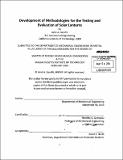Development of methodologies for the testing and evaluation of solar lanterns
Author(s)
Gandhi, Amit A. (Amit Arun)
DownloadFull printable version (6.495Mb)
Other Contributors
Massachusetts Institute of Technology. Department of Mechanical Engineering.
Advisor
Timothy G. Gutowski.
Terms of use
Metadata
Show full item recordAbstract
Solar lighting technologies have reached a point where they are affordable in many developing countries. While many of these products have had a positive impact on communities, the market also has poorly designed and manufactured products that develop a poor reputation among users and hurt adoption rates of solar technologies. current efforts to evaluate solar lanterns have resulted in the development of standards and testing protocols for solar lanterns manufacturers. In this thesis, we explored the development of new user-focused testing methodologies that include both field testing and technical testing. In particular, for the field testing, we applied projective methods to understand biases in reported usage, addressed individual decision making process, and applied maximum difference methodology to understand user-valuation. For the technical testing, we developed a new system for characterizing the light output of solar lanterns and developed embedded instrumentation for solar lanterns to understand how they were used in the field.
Description
Thesis: S.M., Massachusetts Institute of Technology, Department of Mechanical Engineering, 2014. Cataloged from PDF version of thesis. Includes bibliographical references (page 59).
Date issued
2014Department
Massachusetts Institute of Technology. Department of Mechanical EngineeringPublisher
Massachusetts Institute of Technology
Keywords
Mechanical Engineering.